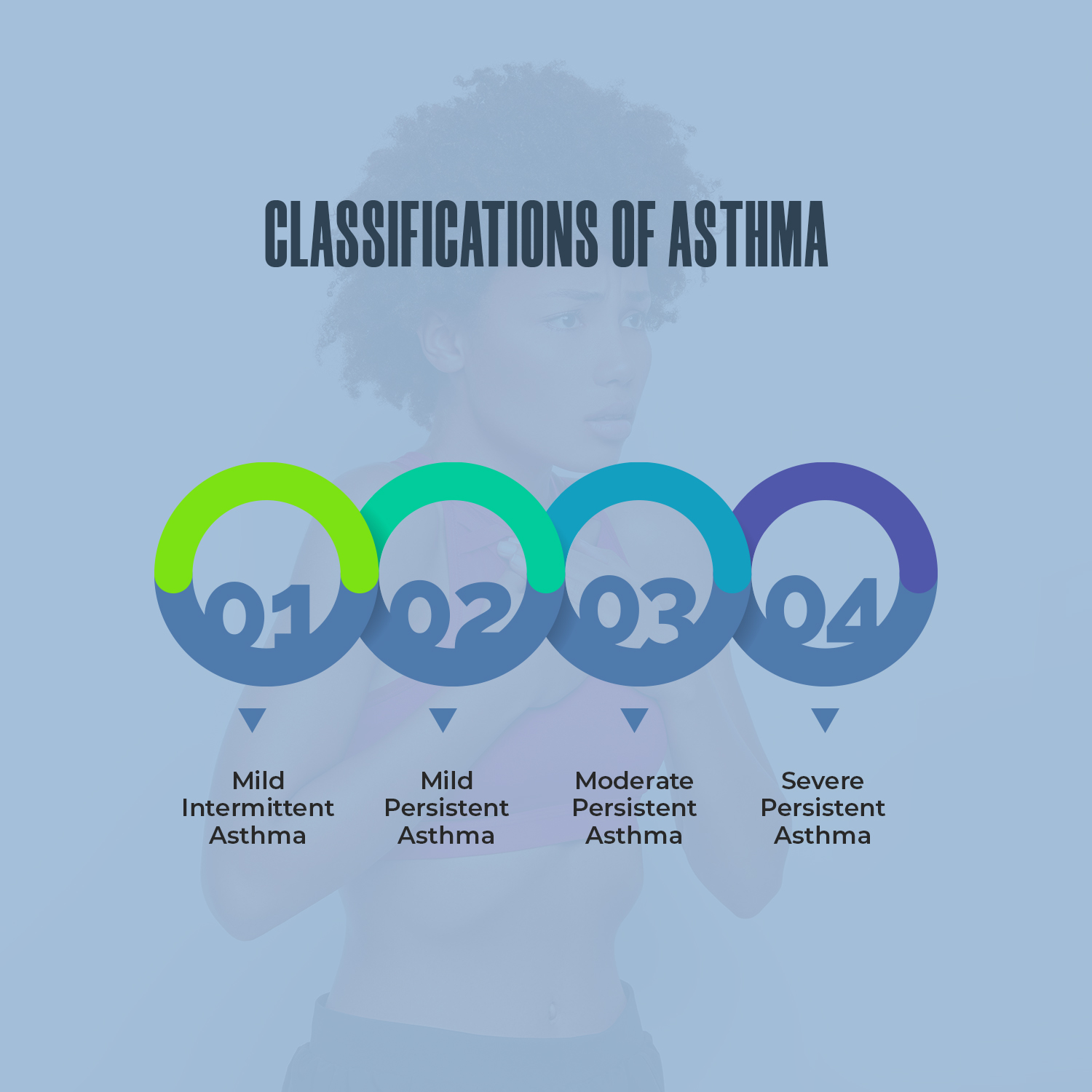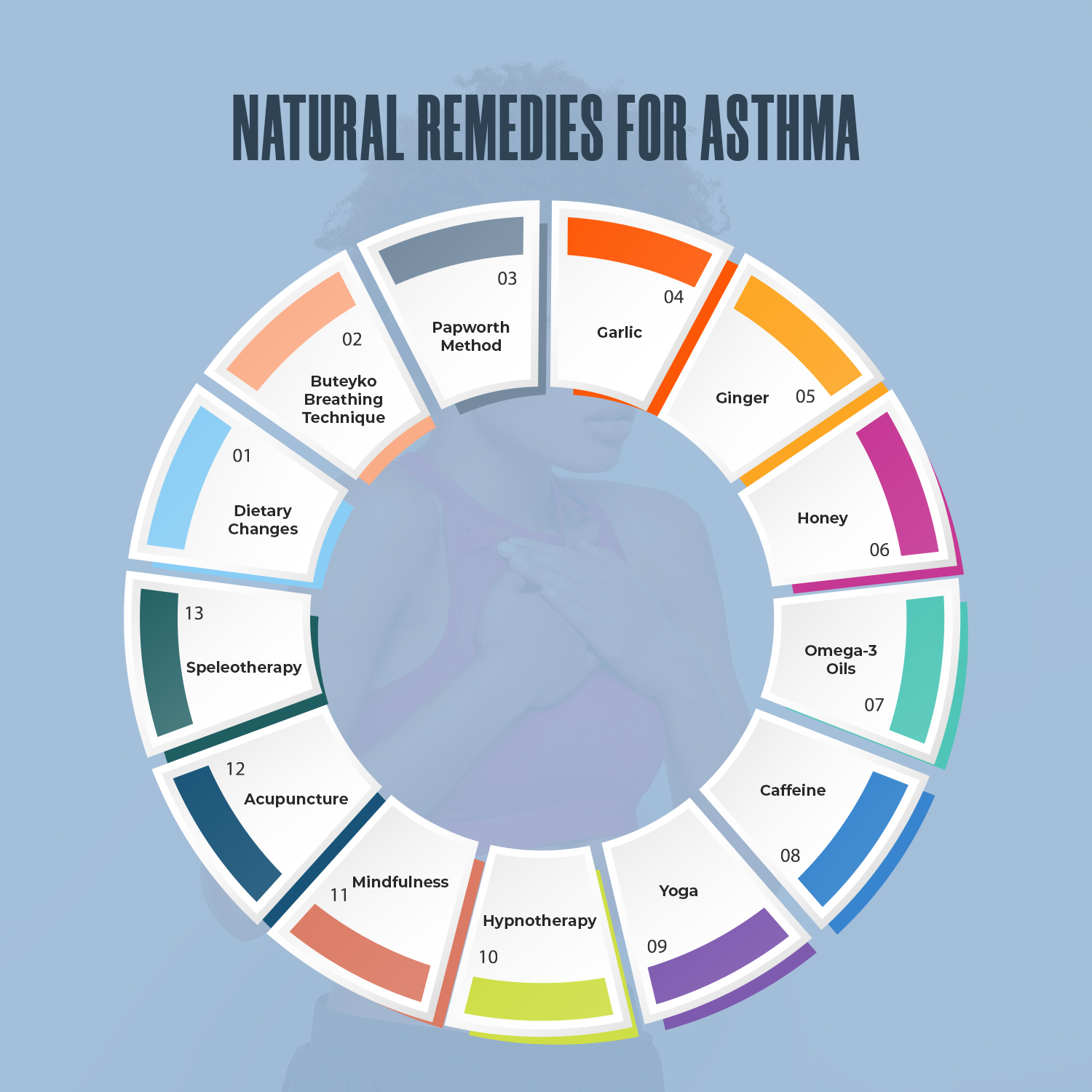Table of Contents
If you are dealing with a severe case of asthma and your regular drugs do not seem to be effective enough to provide the relief you need, you may begin to wonder if there’s any other option to help you cope with your symptoms.
Of course, some home remedies for asthma may be able to ease your symptoms, decrease the amount of medication you are required to take, and ultimately improve your quality of life. However, these remedies are most effective when taken alongside your regularly prescribed asthma medications.
You will learn the following from this post:
- Meaning of asthma
- Classification of asthma
- Types of asthma
- Risk factors associated with asthma
- Causes of asthma
- Natural remedies for asthma
What is Asthma?
Asthma is a long-term lung disease. It narrows and inflames the airways, making breathing hard. Severe asthma can make a person have trouble talking or staying active; it is a chronic respiratory disease. Some people call asthma ‘bronchial asthma.’
Asthma is a severe disease that affects about 25 million people in the United States alone, and it is the cause of almost 1.6 million emergency room visits each year. However, you can live well with asthma with adequate treatment. Without treatment, you might have to frequently visit the ER or stay at the hospital, significantly affecting your daily activities.
What is an Asthmatic Attack?
An asthma attack is an emergency condition in which bands of muscle surrounding the airways are triggered to tighten. This tightening is known as bronchospasm. While the attack is on, the lining of the airways becomes inflamed or swollen, and the cell lining the airways produces more and thicker mucus than regular.
These conditions – mucus production, inflammation, bronchospasm – trigger symptoms such as trouble with normal daily activities, shortness of breath, coughing, wheezing, and difficulty breathing.
Further symptoms of an asthma attack include the following:
- Blue fingernails or lips
- Pale, sweaty face
- The feeling of panic or anxiety
- Difficulty talking
- Tightened chest and neck muscles, known as retractions
- Chest pain or pressure
- Very rapid breathing
- Coughing that won’t stop
- Severe and raspy wheezing when breathing both in and out
An asthma attack can quickly get worse, so it’s crucial to treat these symptoms right away
Classifications of Asthma

Classifications of Asthma
Asthma is ranked by how bad it is from its symptoms:
- Mild Intermittent Asthma. Mild symptoms less than twice a week. Nighttime symptoms less than twice a month. Few asthma attacks.
- Mild Persistent Asthma. Symptoms occur three to six times each week. Nighttime symptoms occur three to four times a month. Asthma attacks might affect activities.
- Moderate Persistent Asthma. Daily symptoms of asthma. Nighttime attacks occur five or more times a month. Symptoms may affect activities.
- Severe Persistent Asthma. Ongoing symptoms both day and night. You have to watch your activities.
Your asthma may be worsening if:
- You experience symptoms more often, interfering more with your daily activities.
- You have a problem breathing. You can measure your breathing with a device called a peak flow meter.
- You rely on a quick-relief inhaler more often than normal.
Types of Asthma
There are various types of asthma; they include:
- Adult-onset asthma. Asthma can attack anyone at any age, but it’s more common in people below 40 years old.
- Status asthmaticus. These long-lasting attacks do not go away even after using bronchodilators. They are medical emergency that requires immediate treatment.
- Asthma in children. Symptoms of asthma in kids can range from episode to episode. Observe the following problems:
- Frequent coughing, especially while laughing, at night, or during play. This may be the only symptom of the asthma
- Less energy or pausing to catch one’s breath during play
- Shallow or fast breath
- Complaining of chest hurting or feeling tight
- A whistling sound whenever they either breathe in or out
- Seesaw motion in their chest due to trouble breathing
- Shortness of breath
- Tight chest and neck muscles
- Fatigue or weakness
- Exercise-induced bronchoconstriction. This is often called exercise-induced asthma. It attacks when one is carrying out physical activities, especially when one breathes in the air drier than what’s in the body. This condition can affect those who do not have asthma, too. A person will begin to notice symptoms within a couple of minutes after they begin to exercise, and the symptoms might take about a quarter of an hour.
- Allergic asthma. Things that trigger allergies, such as pet dander, pollen, and dust, can also cause asthma attacks.
- Nonallergic asthma. This type of asthma worsens in extreme weather. For example, it could be the cold of winter or the heat of summer. It could also attack when you have a cold or are stressed.
- Occupational asthma. This often affects those that work around dust, chemical fumes, or other irritating elements in the air.
- Eosinophilic asthma. This severe form of asthma is marked by high levels of white blood cells known as eosinophils. It usually attacks adults between 35 and 50 years old.
- Nocturnal asthma. This is when the symptoms of asthma worsen at night.
- Aspirin-induced asthma. You may experience the symptoms of asthma when you take aspirin, along with a cough, sinus pressure, sneezing, and a runny nose.
- Cough-variant asthma. Contrary to other types of asthma, the only symptom of cough-variant asthma is long-term cough.
Risk Factors Associated with Asthma
The following are factors that may make you more susceptible to asthma:
- Your job
- Your sex. More boys have asthma than girls. However, it is more common for female teens and adults
- Your race. People of African American or Puerto Rican descent are more susceptible to asthma
- Your genes
- Whether your parents have asthma, especially your mother
- Things in the world around you before your conception or while you’re growing up
- Other conditions like obesity, allergies, or lung infections.
Causes of Asthma
When you have asthma, your airways become more sensitive to things in the world around you. Doctors regard these as asthma triggers. They might trigger symptoms or worsen them. Common asthma causes and triggers include:
- Food preservatives known as sulfites are found in things like bottled lemon and lime juices, beer and wine, pickles, and shrimp.
- Medications such as aspirin
- Strong emotions such as stress, sadness, laughter, or anxiety
- Gastroesophageal reflux disease (GERD)
- Cold air or changes in weather, such as humidity or temperature
- Exercise
- Tobacco smoke
- Air pollution
- Irritants like strong odors from cleaning solutions or perfumes
- Allergens such as pet dander, mold, dust mites, and pollen
- Infections like the flu, colds, and sinusitis
Natural Remedies for Asthma

Home Remedies For Asthma
Below are the various complementary therapies you can try in order to get relief from your asthma symptoms.
1. Dietary Changes
Although there is no particular diet for asthmatic people, you can take a few steps that may give you relief from your symptoms. Being overweight can often make severe asthma worse. Therefore, it is ideal to maintain a healthy and balanced diet, including plenty of vegetables and fruits. Fruits and vegetables are great sources of antioxidants like vitamins C and E, including beta-carotene. These antioxidants can help reduce inflammation of the airways.
If you experience a bout of asthmatic attack after consuming certain foods, try to avoid eating them. It’s possible that you may have developed allergies to that kind of food. Confirm this with your doctor.
2. Buteyko Breathing Technique
The Buteyko Breathing Technique is a breathing exercise system known as BBT. This system may be able to relieve you of your asthmatic symptoms through slow, gentle breathing. The BBT focuses on breathing through the nose instead of the mouth because mouth breathing can dry out the airways and cause them to become more sensitive.
Some people may experience fewer respiratory infections by using the Buteyko Breathing Technique. Others who practice this breathing technique believe that it assists in raising carbon dioxide levels. But there is no definite or conclusive evidence to back this up yet.
3. Papworth Method
The Papworth method is another breathing and relaxation system that has been used as early as the 1960s because it is effective in helping people with asthma find relief from their symptoms. This technique involves using the nose and diaphragm to create a breathing pattern. You can apply the breathing pattern to several activities that may trigger your asthma.
It is better to go through a training course before adopting the Papworth method as part of your daily routine.
4. Garlic
Garlic is generally known to possess several health benefits, such as anti-inflammatory properties. Because asthma is an inflammation disease, garlic may be excellent in relieving your symptoms. However, there is not yet any conclusive evidence to suggest that garlic is effective against the flare-up of asthmatic conditions.
5. Ginger
Ginger also contains anti-inflammatory properties and may seriously help with severe asthma. Research carried out in 2013 indicated that oral ginger supplements helped relieve asthma symptoms. But the research did not confirm that ginger can improve overall lung function.
6. Honey
Everyone generally loves honey due to its myriad of effectiveness and healing properties; it is also frequently used as a cold remedy to help reduce coughing and soothe the throat. You can mix honey with a hot beverage such as herbal tea for relief from your symptoms. However, the scientific evidence to support the use of honey as an alternative treatment for asthma is still relatively limited.
7. Omega-3 Oils
Omega-3 oil or fatty acids can be found in flaxseed and fish. Omega-3 oils have several health benefits. They may also work to reduce airway inflammation and improve lung function in people suffering from severe asthma. High doses of oral steroids can impede the beneficial effects of omega-3 oils. You should first check with your healthcare provider before increasing your intake of omega-3.
8. Caffeine
Caffeine can decrease respiratory muscle fatigue because it is a bronchodilator. Research carried out in 2010 indicated that caffeine can effectively relieve people with asthma of their symptoms. Caffeine may effectively improve the function of the airways for about four hours after intake.
9. Yoga
Yoga is all about breathing and stretching exercises to help increase your overall fitness and boost flexibility. Yoga practice can decrease stress that may likely trigger asthma for many people. The breathing techniques of yoga can also help reduce frequent asthmatic attacks. However, there is no conclusive evidence to prove this claim yet.
10. Hypnotherapy
Hypnosis is a form of hypnotherapy that will make a person relaxed and allow new ways to behave, feel, and think. Hypnotherapy may assist in facilitating muscle relaxation, which may help people cope with symptoms, such as chest tightness.
11. Mindfulness
Mindfulness is a meditation type that concentrates on the feeling of the mind and the body in the present moment. Mindfulness can be practiced almost anywhere. All you require is a quiet place to sit down, shut your eyes, and concentrate your attention on your body’s sensations, feelings, and thoughts. Due to its stress-relieving benefits, this type of meditation can assist in complementing your prescription medication and relieve stress-related symptoms of asthma.
12. Acupuncture
Acupuncture is a kind of old Chinese medicine that incorporates placing a small needle into a certain point on the body. The long-term benefits of acupuncture have not yet been claimed to be effective against asthma symptoms. However, some asthmatic people do find acupuncture pretty helpful, especially in improving airflow and managing symptoms, such as chest pain.
13. Speleotherapy
Speleotherapy involves staying in a salt room to allow tiny salt particles to get into the respiratory system. There is no irrefutable scientific evidence to support the claim that a speleotherapy is an effective form of treatment against asthma. Still, certain research did indicate that it had a beneficial effect on short-time lung function.
Final Thoughts
Some of these home remedies to help with asthma may be able to help reduce the symptoms of asthma. But you should not ignore the medications prescribed by your doctor. In any case, these asthma treatment home remedies should only serve as complementary treatments because many of them have limited or no evidence that they are pretty effective against asthma. Consult your doctor before trying out a new complementary therapy. If you begin to notice any side effects, stop using them immediately.
Post Disclaimer
The information contained in this post "Best 13 Home Remedies For Asthma" is for educational purposes only. Always consult your primary care doctor before using the remedies that are provided. The information is provided by The Hidden Cures and while we do timely, in-depth research on the information that we provide to you, everything stated may not be up to date or accurate from the time it was written.
